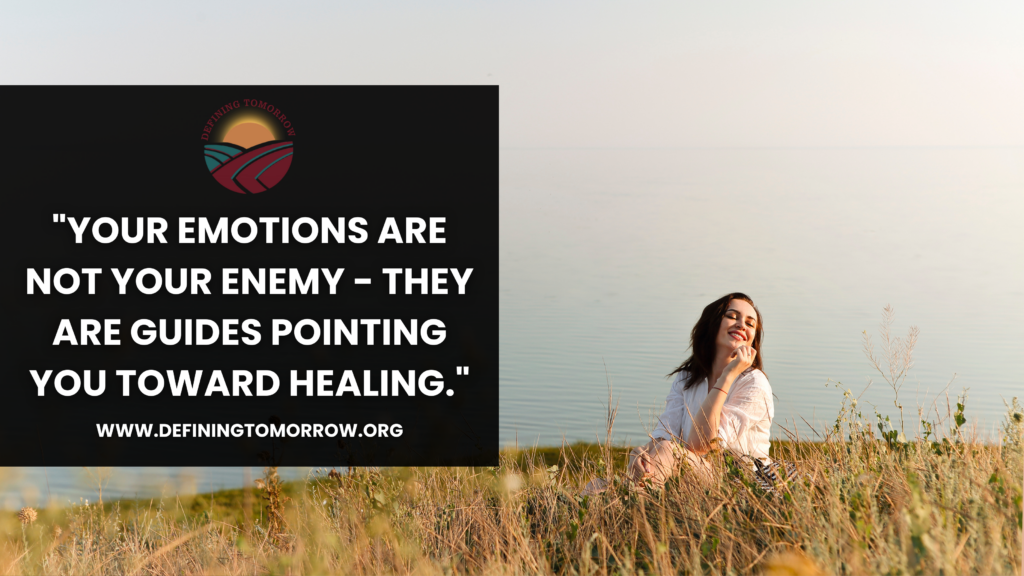
Many people become experts at stuffing emotions. Sadness, anger, and fear feel too heavy, so they are pushed down and hidden. You may have done the same—smiled when you felt like crying, stayed silent when you wanted to scream, or stayed busy so you didn’t have to face what was happening inside.
But the truth is this: avoiding emotions does not make them disappear. The more emotions are ignored, the more they show up sideways—creating stress, anxiety, health struggles, and even broken relationships. Learning how to process emotions is one of the most important steps toward healing and freedom.
Emotions are neither good nor bad. They are signals, much like physical pain that alerts you when something is wrong. Anxiety might signal that you’re facing uncertainty. Sadness can point to something lost. Anger often shines a light on injustice. Joy highlights what matters most to your heart.
When you begin to see emotions as signals rather than enemies, you can approach them with curiosity instead of fear.
Even the emotions often labeled as “negative” serve a purpose. Anxiety can be a warning sign that helps protect you. Sadness creates space to grieve and heal. Anger highlights wrongs and motivates necessary change. Fear keeps you safe from potential harm.
Trouble arises when emotions are suppressed instead of processed. When ignored, the gifts each emotion carries are missed.
You’ve probably heard someone say, “Just get over it.” But suppressed emotions rarely go away. Instead, they grow stronger and often show up in destructive ways. Many people who avoid emotions find themselves weighed down by constant stress, overwhelmed by even small challenges, or disconnected from the people they care about. Some turn to numbing habits like overeating, overworking, or unhealthy relationships. Others begin experiencing physical symptoms as the body carries the weight of unprocessed feelings.
The moment you choose to process emotions, you open the door to healing. Facing them is not weakness—it is an act of courage that leads to honesty, connection, and freedom.
Emotional intelligence is the ability to understand and manage emotions in healthy ways. In my workbook, I highlight four key areas that can transform how we relate to ourselves and others.
Recognizing what you’re feeling and why. Example: noticing that your anger is tied to feeling dismissed or unheard.
The ability to manage your responses rather than being controlled by emotions. Example: choosing to pause before reacting in anger.
Understanding the emotions of others with empathy. Example: putting yourself in someone else’s shoes before responding.
Using awareness of your own emotions and others’ to build healthier, stronger connections. Example: having hard conversations with honesty and care.
These four skills don’t develop overnight, but practicing them daily creates lasting change in how you navigate the world.
Emotions influence more than just moods; they shape the course of life itself. Every experience sets off a chain reaction:
Exposure leads to thoughts. Thoughts stir up feelings. Feelings influence decisions. Decisions create actions. Actions repeated over time form habits. Habits shape character. And character determines destiny.
When emotions are suppressed, they quietly drive this cycle in unhealthy directions. But when emotions are processed, they can be harnessed to shape choices, habits, and ultimately, destiny.
It can feel overwhelming to know where to start, but there are small, practical steps that make a real difference. Begin by naming the emotion. Simply putting words to what you are feeling reduces its power. Pay attention to how it shows up in the body—whether anxiety feels like tightness in the chest or anger feels like heat rising in the face.
Writing your feelings down gives them a safe place outside of your mind. Sharing them with a trusted person reduces the sense of isolation and creates space for support. And through it all, respond with compassion. Instead of judging your feelings, acknowledge them: “It makes sense that I feel this way.”
Processing emotions is not about perfection—it’s about progress. Each time you choose to face what you’re feeling instead of hiding it, you grow stronger. Emotions are not here to destroy you; they are here to guide you.
When you stop ignoring emotions and begin processing them, you reclaim your story. You gain freedom. And you take powerful steps toward the life you were meant to live.
You don’t have to process your emotions alone. Healing is a journey, and I’d be honored to walk with you.
Book a discovery call with me today to learn more about joining one of my support groups. Together, we’ll create a safe space where you can heal and grow.
Or, if you’re not ready for a call just yet, I invite you to join my mailing list for ongoing encouragement, tools, and resources.
Our support groups are $25 per week or $300 for the full 13-week program when you pay in full.